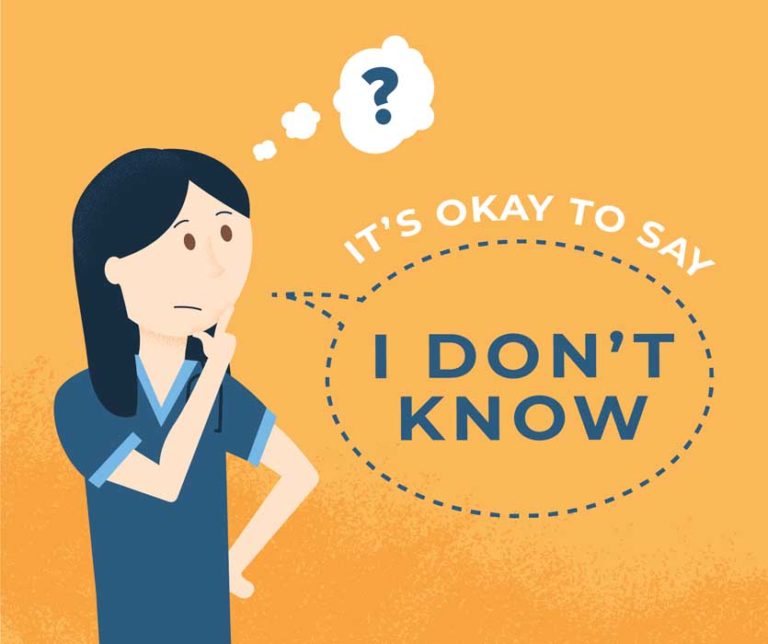Nurses are the most trusted profession on the planet, according to Forbes. They are recognized as being honest and of high ethical standards, which is a testament to the trust patients put in nurses when they check into a hospital or care facility.
But, one challenge that nurses sometimes face is the ability to acknowledge they need help or information before they can complete a task or provide care. When a nurse walks into the room to talk to a patient they are expected to give an honest, accurate answer. Patients count on that in order to feel safe, know they have the right information, and feel confident with any decisions they need to make. Some nurses will try to answer based on assumptions or what they think they know. But, a trustworthy nurse will admit they may not have the answer but assure the patient they will go get it. They won’t lie, bluff, or make it up as they go.
I knew a nurse, Jennifer, who was in a hurry to discharge an ER patient. She had goals to meet and wanted a break. In this case, she had a new employee with her and the two of them opened the ER curtain. Without introductions, they announced that their patient needed to eat crackers to assure his stomach could keep them down before he could go home. ‘Are those crackers?’ his mom asked. ‘Yes!’ the nurse replied. ‘He has Celiac disease’, his mom replied. Mom knew the nurse did not know where this conversation was going. ‘He can’t have gluten.’ Still, the nurse stuck out the crackers to hand the boy. ‘Crackers are made with gluten.’ The mom sighed and provided the education ‘Gluten is a protein found in wheat, rye, barley. Those crackers are made with wheat. If he eats wheat he will become very sick and we will be going nowhere.’ Still staring, almost as in a contest, she finally said, ‘You need to find something he can eat then so he can go home.’
Do you see what opportunities were here? She had a number of opportunities to gain trust, build a relationship, and provide confidence that she was of high integrity having the patient as her first priority. Introductions are always critical, it shows the intention of having a relationship even if it is brief. Admitting you didn’t read the record, don’t know what Celiac disease is or don’t know what gluten is are all ok! As a nurse, you don’t want to make a mistake, give a wrong medication, or not do the correct assessment before completing a procedure. You can’t know everything and won’t as there are new discoveries every day. Jennifer was not practicing that number one rated nursing practice. I am not saying she didn’t care but perhaps didn’t want to admit she didn’t know.
Always introduce yourself, it’s what kind people do. Never be afraid to say ‘I don’t know!’ It shows that you have the best interest in mind for your patient. Ask someone else for help if you can’t find the information you need or help in doing a procedure for the first time. You will have a great career knowing that in every situation you did what you could to build trust and provide the best care possible. ‘Hi, I’m Susan. The doctor would like to see if Cody can eat something and keep it down. I see he has Celiac disease and has gluten listed as an allergy. Can he eat crackers? ……What can he eat? We have applesauce, jello, and pudding. We might have popsicles. Would any of those work?’ There is one happy mom, looking at the nurse who took an extra minute to know her son and make sure he would go home safe and sound.
Guest Post: Judy Gates, RN, MSN is a Banner Health Clinical Education Director and is accountable for providing managerial and clinical education support. She has worked as a pediatric and trauma ICU nurse and wound care consultant. She is a published author and thought leader.
